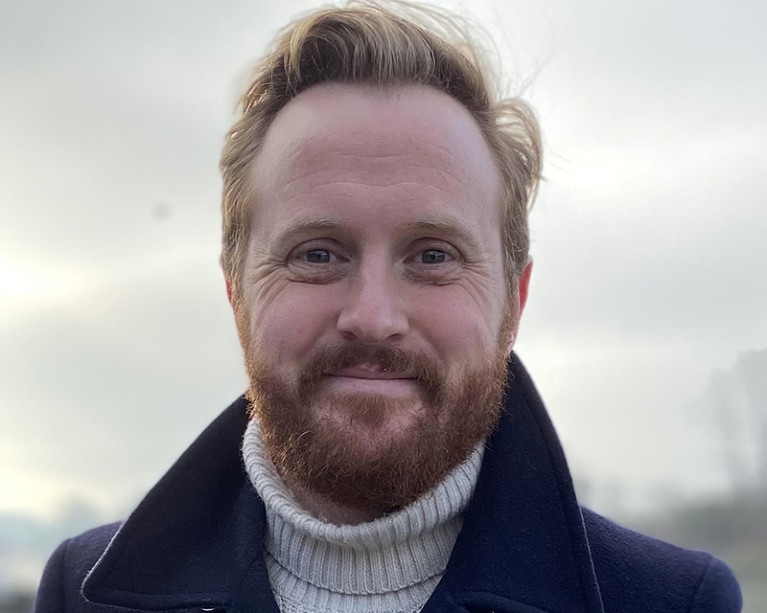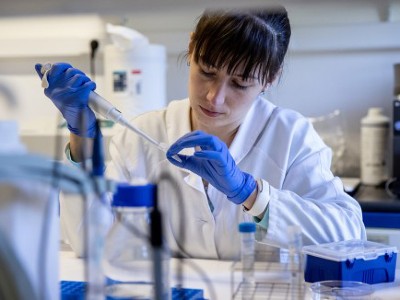
Moving from an academic lab to an industry one can be a culture shock.Credit: Solskin/Getty
Jonathan Bowen left clinical medicine in 2016 for a role in the pharmaceutical industry and is now drug company Sanofi’s medical lead for haemato-oncology, in Reading, UK. In 2020, he and a colleague founded workwithpharma.com, an online mentoring resource that helps scientists and clinicians to navigate moving from academia, medicine and health professions into pharma.
Here, he offers advice on making the change, culture shock and the tricky business of negotiating a pay rise.
Describe your career so far.
Soon after qualifying as a medical doctor in 2010, I started thinking about alternative careers — not because I wasn’t enjoying medicine, but because I was looking at everything that motivates me in and out of work, and I wondered whether something was missing. I loved my job as a doctor and treating patients, but I had never been one of those people who had wanted to be a doctor ever since they could remember. But I didn’t want to leave medicine altogether because of the big commitment I’d already made.
Training: Networking for researchers
I have always enjoyed the challenge of learning something new, and you get that motivation in the pharmaceutical industry, because you’re always learning and applying your knowledge.
In 2016, I got a job at a clinical research organization, managing trials for drug companies.
After that, I took my first role in industry: I worked in medical affairs at a leading pharmaceutical company, where I spent three years as a medical adviser in haemato-oncology. In 2021, I joined Sanofi’s haemato-oncology team as a senior adviser, and a year later, I became the company’s medical lead for the United Kingdom and Ireland.
How does your career experience compare with that of your colleagues who have come from academic research?
In my current team, are two academics who have PhDs — their experience is very different from mine, but there are a lot of parallels. Before getting into pharma, they were also used to working very hard for comparatively low pay, and academics experience the same culture shock and guilt that medics do: they can feel that they’re turning their back on their career and the institutions that trained them.
Tell us about workwithpharma.com.
I thought up the website about two and a half years ago, when I realized that my experience of navigating the career transition was similar to what everyone else goes through. Careers in the industry sound appealing, but it can be hard to find out more about what the job entails, or where to start. I produced some resources for people looking to switch careers, and to bridge the gap in experience that everyone has when getting their first job. My co-founders — a PhD academic and a pharmacist — and I provide free advice and links to useful information, and we offer training courses and 1:1 coaching and mentoring. Our information is largely centred on the UK pharmaceutical industry, but the more general advice is relevant to jobs in the United States, Europe and Australia.
What is the most common question you are asked?
It is: “How did you get into pharma?” I am happy to describe my journey, but it is much more practical to turn the question around and say, “Why do you want to join industry?” That will give someone much more insight into what it is they want from a career while highlighting what they don’t know. Other common questions are related to the application and selection process — people want to know how to excel at an interview, and what types of question are asked.

Jonathan Bowen is the medical lead for haemato-oncology at Sanofi in Reading, UK.Credit: Dr Jonathan Bowen
We also get different questions from people with different backgrounds. For example, PhD academics want to know about specific roles suited to their experience. We align the advice we give so that it comes from a member of our team with a matching professional background — a doctor, an academic or a pharmacist.
What was one of the hardest parts of the recruitment process?
In the UK National Health Service (NHS), you work really hard, but you don’t necessarily have to think about the minutiae of your career — you’re somewhat funnelled along. It’s the same with academia, I think — there are pay bands, and it’s all fairly transparent. That was probably the biggest culture shock. Having to negotiate pay can be stressful, especially when you’re inexperienced — that’s when it’s good to go to a recruitment agency, so they can do that on your behalf.
Careers advice from scientists in industry
How easy was it to adjust to your new career?
One of the biggest misconceptions I had was that I would turn up on day one and be put to work. New starters have to learn so much, and it took me about three to six months to learn everything: the intricacies of a complicated disease area, the pharmaceutical industry itself, all the regulatory codes, health economics, medicines appraisals and marketing. I read up on all of these subjects before joining, but I still had to learn on the job. If you go to a big pharma company, you might go through a really slick onboarding process. But if you go to a smaller biotech firm or a company that’s not as experienced at training people who are new to industry, you might not get as much support.
Did you have experience in the specific disease area you’re working in?
I had limited experience in haemato-oncology before working in pharma. It obviously helps if you know the disease, but as a medic, you’re being recruited for a range of qualities and experiences, such as your expertise in the health-care structure. I work closely with scientific advisers and medical and scientific liaisons, who often work in relevant areas. Their understanding of the science can be applied to your projects.
The NHS is a taxpayer-funded non-profit organization. Does it feel strange to work for one that is driven by profit?
People always joke that you’re going to the ‘dark side’ when you move to pharma — but if you choose a good employer with a good reputation, whose products genuinely benefit patients, then you are working for the greater good. Somebody needs to research, develop and deliver these medicines and provide access to them.
Working at a corporation with lots of resources is also a culture shock, after coming from an institution, such as the NHS, with limited resources. For example, setting up a research study can sometimes take years, whereas in the pharma industry, getting a project going can happen more quickly.
Leaving academia for industry? Here’s how to handle salary negotiations
It’s not the ‘easy’ option. Making the decision to change careers and to learn and work in a new industry is demanding. It will put stresses, both good and bad, into your life. I have to keep abreast of a wide range of complicated projects, in an area of ever-increasing scientific advances. Every day, there is something new to learn or adapt to. That is demanding and stressful, but if you enjoy the work, the stress can be positive.
What’s your one key piece of advice for someone who wants to quit their current role?
You have to make sure you’re looking to change careers for the right reasons. Everyone can write down something that they don’t like about their current job, but could forget about it in a few months’ time. The thing that’s most important is what has pulled you towards your new career.

 Leaving academia for industry? Here’s how to handle salary negotiations
Leaving academia for industry? Here’s how to handle salary negotiations
 Careers advice from scientists in industry
Careers advice from scientists in industry
 Mentoring resources
Mentoring resources








